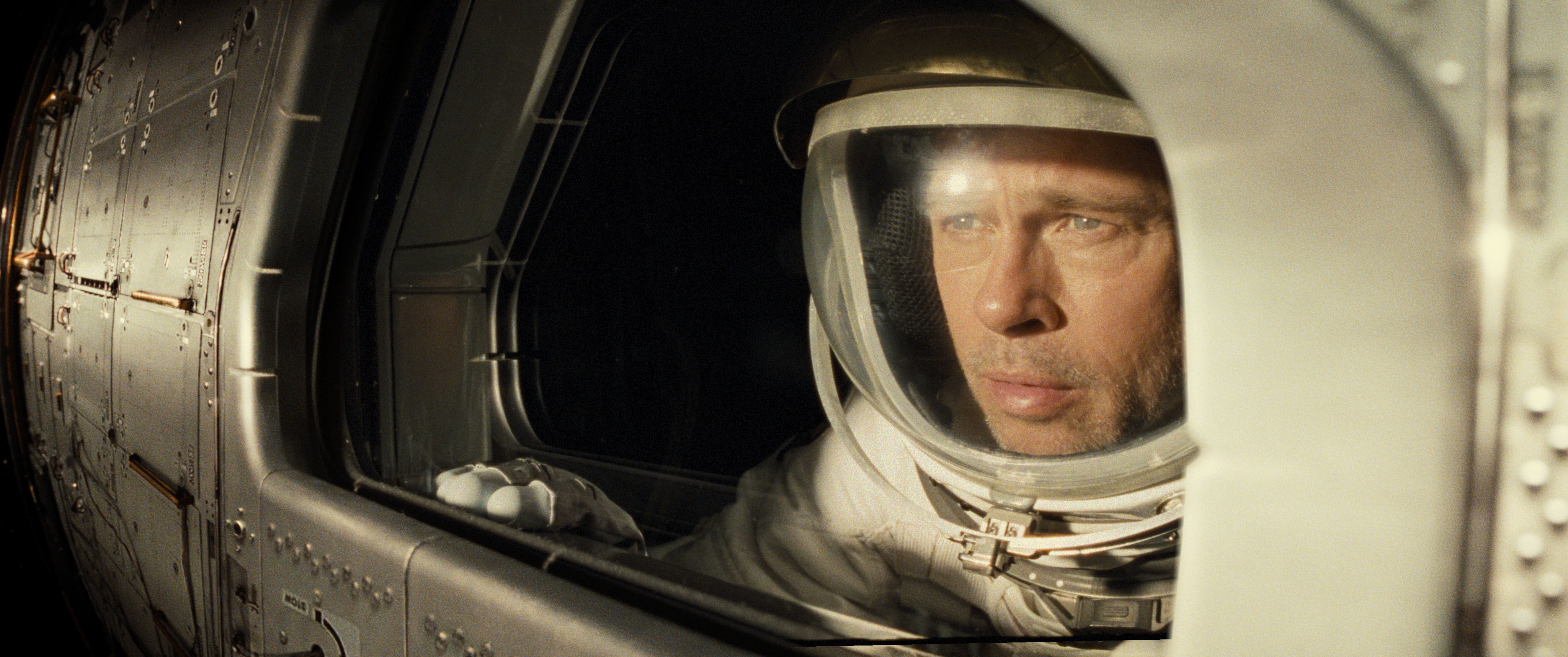
Trips to the stars often involve a lot of isolation and a sense of hopelessness when on a voyage into endless black. Trapped within spacecraft on long journeys, there’s time to contemplate and ask tougher questions within ourselves. Most sci-fi pictures always seem to get lost within the act of survival and saving humanity that we often lose sight of this internal conflict. This is not the case with Ad Astra, a space epic that never loses sight of its character and his personal struggles.
Major Roy McBride (Brad Pitt) would seem like the perfect candidate for a space mission requiring no emotion. He is dedicated and hardened enough to his job as an astronaut that even when a space elevator starts belching fire, he maintains his cool. No rise in his heartbeat and no emotion on his face. The military naturally loves such a devoted individual. They love him so much that he’s the perfect candidate for a mission to convince Roy’s long-lost dad (Tommy Lee Jones) to stop sending energy waves across the galaxy.
But Roy’s condition to not question or emote comes from an ignorance of his deceiving higher-ups and an inner deception. We see brief glimpses of Roy’s non-professional life, past and present. In the past, his father was distant in troubles that are nearly forgotten. In the present, Roy is unsure and also distant from his wife (Liv Tyler). One could easily understand his quietness in choosing not to address the sins of the father. But this is an issue he’ll collide with head-on when Roy’s father’s friend (Donald Sutherland) reveals the truth; dad has gone rogue. And the only one who can save Roy’s father is Roy himself if he’s willing to talk and open himself up to a man he fears.
There are many spots within Ad Astra where the film could lose its way, doomed to be lost in a plot of action and cliches. The world-building is heavy here where Roy’s mission takes him to a colonized moon and an animal research space station. A different film may have focused just on the pirate battle for resources on the moon or the experiment gone awry on the station. But the film remains firmly rooted within Roy’s head so we’re constantly feeling everything that passes through his mind as the emotion slowly comes to him.
I’m fully aware of how cliche Ad Astra may seem for treading in such territory of understanding humanity amid the vastness of space. Bits and pieces of this story are strewn throughout Gravity and Interstellar. Ad Astra, however, is the full meal. It makes the time for its characters to shine and showcase how far empathy and honesty can take someone, as when a Mars scientist (Ruth Negga) has the kindness to be truthful when Roy and send him in the right direction.
This film seems as though it has a lot going on within its structure, perhaps even dabbling into autism with how it displays certain autistic traits within Roy. Yet it never feels like the film is trying to go heavy-handed or all that hand-holdy with this material, despite the constant voice-over narration from Roy. Typically, voice-over is considered sloppy writing for explaining everything. Roy, however, only reveals just enough for us to understand him and his world, never harping too much on the little aspects that could get in the way of the picture’s true sense of humanity. Have I mentioned this film is gorgeous? It’s a special effects marvel with seamless zero-g environments and rustic environment for off-world colonies that feel believably clunky. It fully immerses us into its world without having a need to explain itself too much either.
This is the type of introspective sci-fi epic that I always adore, brimming more with grand ideas and conflicted characters than relying on the genuine spectacle of traveling across the galaxy. That being said, there’s plenty of that grand display as well, perfectly placed within a somber tone. It’s a film that lingers in the mind long after and I’m pleased to make it a mental resident.

 “Deadpool & Wolverine” Review
“Deadpool & Wolverine” Review  “The Boys: Season Four” Review
“The Boys: Season Four” Review  “The American Society of Magical Negroes” Review
“The American Society of Magical Negroes” Review  “Twisters” Review
“Twisters” Review  “Sausage Party: Foodtopia” Review
“Sausage Party: Foodtopia” Review  “Robot Dreams” Review
“Robot Dreams” Review  “Godzilla x Kong: The New Empire” Review
“Godzilla x Kong: The New Empire” Review  “Slave Play. Not a Movie. A Play.” Review
“Slave Play. Not a Movie. A Play.” Review 


